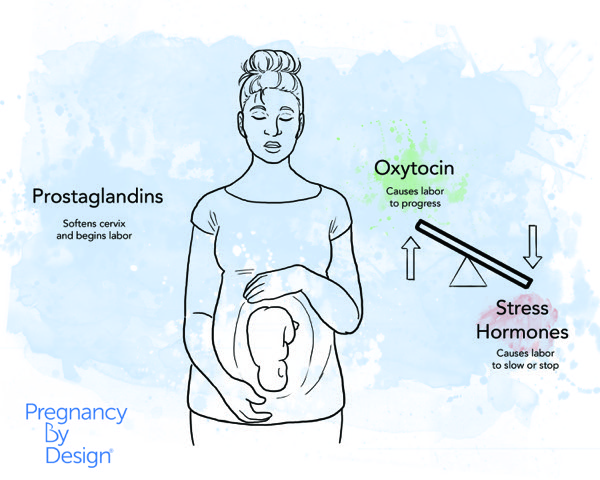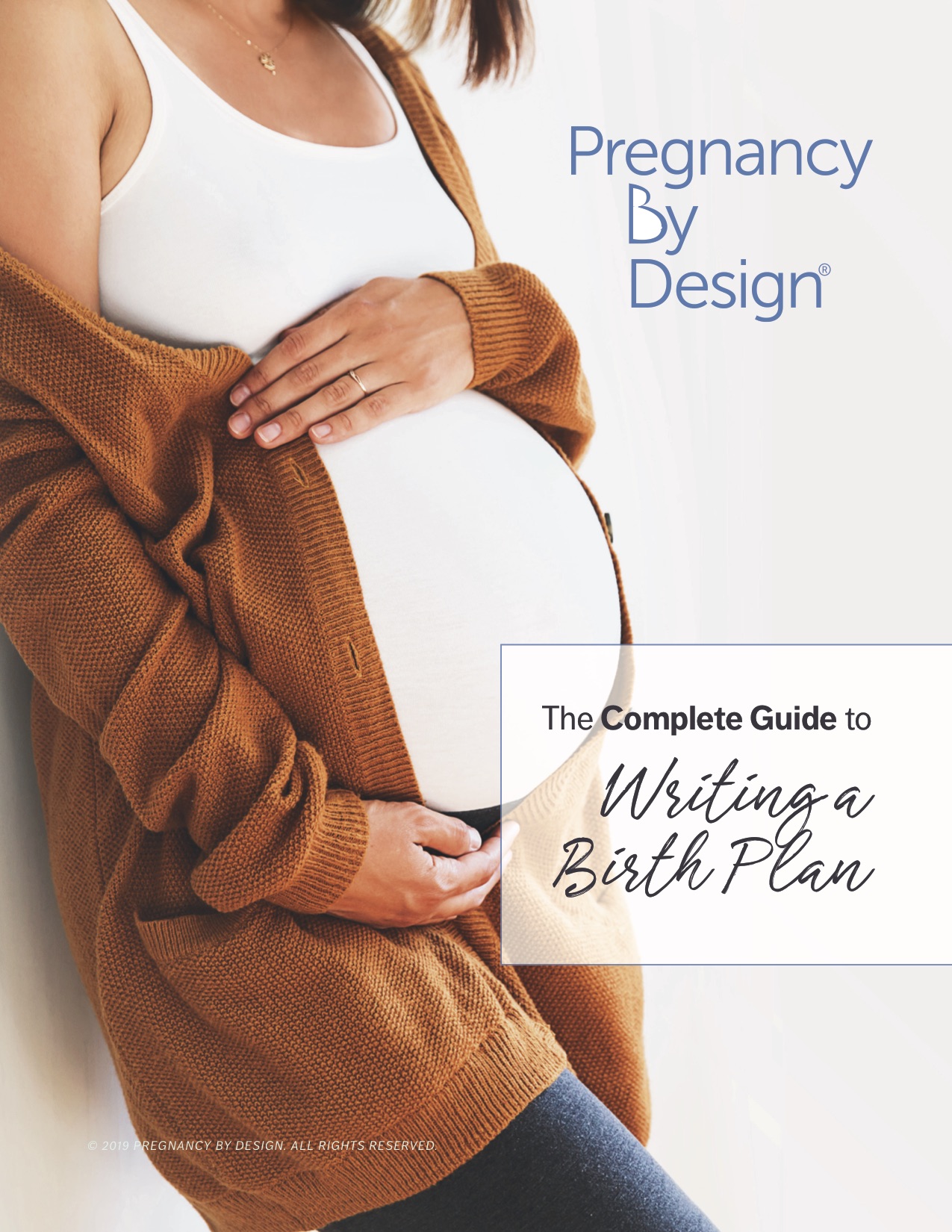Fear of childbirth is a significant factor that shapes how a woman experiences labor, and even what kind of birth outcome she’s likely to have.
Usually, fear about childbirth arises out of 1) a lack of birth knowledge and 2) a woman’s expectations about birth. A mother who has negative expectations about birth, or a first-time mother who doesn’t know a lot about how the birth process normally goes, is likely to have more fear than a mother who has positive expectations and feels more confident in the birth process.
Extreme fear of childbirth is called tokophobia (Bhatia & Jhanjee, 2012). This is basically a phobia of pregnancy or childbirth. Tokophobia can cause women to avoid pregnancy and/or childbirth. Primary tokophobia occurs when a woman dreads childbirth, but has no previous experience of pregnancy or birth.
Secondary tokophobia develops when a woman has a previous traumatic birth or obstetric event. If you suspect your extreme fear of childbirth could be diagnosed as tokophobia, reach out to a licensed mental health professional for help, in addition to reading the following information.
Where Do Our Expectations Come From?
Expectations about childbirth are influenced by what we see in media (movies and TV) and stories from family and friends. Our past experiences certainly affect our expectations, too. Women with a history of difficult or traumatic birth, or who are survivors of assault or abuse, understandably struggle with negative expectations and fear about birth.
It’s amazing, isn’t it, that when you get pregnant, the birth horror stories come out of the woodwork. Family and friends seem to love telling about how hard and how long their labor was. I think those women have a motivation to feel heard and validated for the hard things they went through or the loss of control they felt in their own births. So I don’t blame them for wanting to share their stories. But the impact on the pregnant woman is powerful!
Expectations about childbirth are also shaped by what we google online, see in movies, on social media and TV. Many times, childbirth is shown in the media to be a dramatic, emergency situation. Labor often begins with the mother’s water breaking with a huge splash, and then she’s immediately seized in the throes of pain. She must be rushed off to the nearest hospital.
The not-so-subtle message here is that women are weak and incapable, and that childbirth is frightening and dangerous. If your view of childbirth has been shaped by images like these, your own labor might be negatively impacted.
What we hear, see, and read about birth is really significant in shaping how we think it will go for us, too. “Oh, my mom went past her due date, had to be induced and had a really long labor, and it’s probably going to go the same for me!”
I think many of us can identify with that type of thought as we try to predict or guess how our birth might go. And if we’ve been through birth before, that experience often guides our expectations for next time – for good or bad.
Your Expectations About Childbirth Matter
Your level of fear or nervousness and your expectations matter a lot. Researchers have studied women’s expectations and their experience of birth. Negative expectations lead to negative thoughts about birth, which often increases fear. Studies have found that negative expectations predict emotional and physical childbirth complications (Zar, 2002, Niemenen et al, 2015).
Indeed, the more fears a woman has about childbirth ahead of time, the more it seems the birth becomes unpleasant in a self-fulfilling way (Handelzalts et al, 2015). And having a negative birth experience can lead to a woman feeling more fear about future birth experiences, repeating the cycle again.
Fear of labor or fear of pain leads women to choose more interventions, especially pain relief such as epidural anesthesia (Heinze & Sleigh, 2003). (You can read more about epidural anesthesia here). Women who have greater fear about childbirth sometimes have higher rates of c-section.
They might request c-section to try to escape or avoid labor (Wiklund et al., 2008), or the c-section might be due to an emergency while attempting a vaginal birth. Both outcomes can be traced back to higher levels of fear (Fenwick et al., 2009; Nieminen et al, 2009). So a woman’s fear about childbirth has real, significant impact on her birth experience and outcome.
A woman’s fear during pregnancy can affect her baby, too. Research suggests that when women experience high levels of anxiety during pregnancy, such as those associated with anxiety disorders, it predicts higher stress hormones in the child during pre-adolescence (O’Connor et al., 2005). Prenatal anxiety has also been linked with a decrease in certain types of immunity in infants (O’Connor et al., 2013).
Therefore, when a woman takes steps to address fear and anxiety during pregnancy, it will probably benefit her baby’s physical and mental health, too! It’s a good idea to discuss any fears you have about childbirth with a licensed counselor and/or your prenatal healthcare provider early on (if possible before your third trimester) so you have plenty of time to work through your fears – but it’s never too late.
How Does Fear Affect Childbirth?
So how does this work, the connection between expectations, fear of birth, and how birth goes? From what we know about childbirth, the connection makes a lot of sense. A higher level of fear leads to higher levels of stress hormones, which chase away Oxytocin, which is the hormone that helps labor to progress. Feeling fear can stall your labor, which means probably interventions will be suggested.

For example, when a mother has fearful thoughts going through her mind what do you think happens in her body? She tightens her muscles, often clenching her pelvic floor and her face as well as other muscle groups, known as the fear – pain – tension cycle.
Muscles that are clenched and tight work against effective contractions, they get less oxygen. Tight muscles with less oxygen lead to more painful contractions. In turn, this greater pain increases the woman’s level of distress, and maybe takes her fear up another notch.
You can see how this could lead to medical interventions as she gets desperate for relief. The cycle can even contribute to fetal distress if the mother is not breathing well or moving around well. Moving in labor is important. Being tethered to a bed is not conducive to normal birth!
In contrast, a woman who feels less fear usually has an easier time relaxing the muscles in her body. Her fear is reduced by her knowledge that birth is normal and part of the human experience. Her calm mental state translates to loose, open muscles, especially in her pelvic floor. Her mental “yes” to the sensations of labor helps her Oxytocin to flow well. Her relaxed, oxygen-rich muscles help her to feel less pain during each contraction. In turn, she continues to feel more calm and relaxed as labor progresses. We call this the “accept – relax – relief” cycle.
Transforming Fear into Confidence
The good news is that you are not stuck with your current level of fear or current expectations about birth. Your fear does not have to feel like a prison. You are not doomed for certain to have a negative birth experience. There are powerful tools available to help transform the way you think and feels about labor!

3 Ways to Reduce Fear About Giving Birth
1. Learn About How Birth Works
You can reduce your level of fear by learning about the process of birth and gaining mental and physical preparation tools for labor. Start by taking a good childbirth education course. A 2016 study showed that mothers who took childbirth education classes were 25% more likely to have a vaginal birth than those who didn’t. Learning about the process of labor, how your body works, and preparing yourself mentally and physically can help reduce your anxiety and increase your chances of having a positive birth experience.
Pregnancy by Design offers comprehensive childbirth education called Beyond the Birth Plan Childbirth Course. This self-paced course will help you identify specific fears about birth and will walk you through specific steps to challenge those fears. During the course you will develop a birth affirmation (or a coping thought) that directly answers that fear. Usually, the birth affirmations focus on your strengths and thoughts instead of focusing on labor itself.
2. Be Mindful of What You Watch/Listen to
It’s important to be mindful of what and who influences our thoughts during pregnancy. This may mean skipping over a scene in a movie that paints birth as scary or kindly stopping a well-meaning friend from sharing her negative birth story with you. Instead, make time to read and watch positive birth stories and be encouraged by the many women in the past that have given birth since the beginning.
3. Surround Yourself with a Strong Support System
Your support system is important! Those who will have the biggest influence on your birth experience include your provider, your spouse, closest family/friends and your doula if you’ve hired one. You should feel comfortable sharing your feelings and any fears you have about birth with your provider. If you are not comfortable doing so, you may want to switch to a new provider.
Also be sure to talk through your fears and desires for your birth with your spouse. Include your spouse in your childbirth education so that you are both on the same page which should help to reduce stress. Partners should understand the physiology of how your body is designed to bring a baby into the world. Lastly, consider hiring a doula. Birth doulas provide continuous labor support which has been shown to lower the amount of time spent in labor, reduce a woman’s anxiety, decrease the rate of medical interventions (including C-sections) and improve mother-baby bonding.
Bottom Line
The change in expectations and fears does not have to be drastic or unrealistic in order to help. Women do not have to change their fear into excitement or eagerness about birth in order to have a better birth. If a mother can shift from intense fear to a realistic expectation that birth is hard, and she is able to do it, she is likely to have a better birth.
In fact, realistic expectations have the best chance of being met. When realistic, positive expectations are met during birth, a mother tends to be happiest with her birth (Hauck et al., 2007). For example, a woman who learns to view herself as flexible and expects to cope with whatever birth brings, will probably be more satisfied than a woman who expects birth to unfold in an ideal way.
Pregnancy by Design offers education and tools to help women make these transformations in their fears and expectations. Our Beyond the Birth Plan Childbirth Course empowers women to choose how they shape their thoughts about birth and build their birthing confidence.
Take our free Personal Childbirth Quiz and learn about how your personalty and beliefs can shape your birth experience.
Get insights on your personality and childbirth!
Yes! I want to learn more about myself. (CLICK HERE)
Disclaimer: Pregnancy by Design’s information is not a substitute for professional medical advice or treatment. Always ask your healthcare provider about any health concerns you may have.
Cited Research:
Afshar, Y. et al. 279: Higher odds of vaginal deliveries in women who have attended childbirth education class or have a birth plan. American Journal of Obstetrics & Gynecology, Volume 214, Issue 1, S162. https://www.ajog.org/article/S0002-9378(15)01623-3/fulltext
Bhatia, M. S. & Jhanjee, A. (2012). Tokophobia: A dread of pregnancy. Industrial Psychology Journal, 21(2), 158-159. https://www.ncbi.nlm.nih.gov/pmc/articles/PMC3830168/
Fenwick, J., Gamble, J., Nathan, E., Bayes, S., & Hauck, Y. (2009). Pre- and postpartum levels of childbirth fear and the relationship to birth outcomes in a cohort of Australian women. Journal of Clinical Nursing, 18(5), 667–677. https://doi.org/10.1111/j.1365-2702.2008.02568.x
Handelzalts, J., Becker, G., Ahren, M.-P., Lurie, S., Raz, N., Tamir, Z., & Sadan, O. (2015). Personality, fear of childbirth and birth outcomes in nulliparous women. Archives of Gynecology & Obstetrics, 291(5), 1055–1062. https://doi.org/10.1007/s00404-014-3532-x
Hauck, Y., Fenwick, J., Downie, J., & Butt, J. (2007). The influence of childbirth expectations on Western Australian women’s perceptions of their birth experience. Midwifery, 23(3), 235–247. Retrieved from https://doi.org/10.1016/j.midw.2006.02.002
Heinze, S. D., & Sleigh, M. J. (2003). Epidural or no epidural anaesthesia: relationships between beliefs about childbirth and pain control choices. Journal of Reproductive and Infant Psychology, 21(4), 323–333. https://doi.org./10.1080/02646830310001622132
Nieminen, K., Malmquist, A., Wijma, B., Ryding, E.-L., Andersson, G., & Wijma, K. (2015). Nulliparous pregnant women’s narratives of imminent childbirth before and after internet-based cognitive behavioural therapy for severe fear of childbirth: a qualitative study. BJOG: An International Journal Of Obstetrics And Gynaecology, 122(9), 1259–1265. https://doi.org/10.1111/1471-0528.13358
Nieminen, K., Stephansson, O., & Ryding, E. L. (2009). Women’s fear of childbirth and preference for cesarean section – a cross-sectional study at various stages of pregnancy in Sweden. Acta Obstetricia et Gynecologica Scandinavica, 88(7), 807–813. https://doi.org/10.1080/00016340902998436
O’Connor, T. G., Ben-Shlomo, Y., Heron, J., Golding, J., Adams, D., & Glover, V. (2005). Prenatal anxiety predicts individual differences in cortisol in pre-adolescent children. Biological Psychiatry, 58(3), 211–217. Retrieved fromhttps://doi.org/10.1016/j.biopsych.2005.03.032
O’Connor, T. G., Winter, M. A., Hunn, J., Carnahan, J., Pressman, E. K., Glover, V., … Caserta, M. T. (2013). Prenatal maternal anxiety predicts reduced adaptive immunity in infants. Brain, Behavior, And Immunity, 32, 21–28. https://doi.org/10.1016/j.bbi.2013.02.002
Roosevelt, Lee et al. Exploring Fear of Childbirth in the United States Through a Qualitative Assessment of the Wijma Delivery Expectancy Questionnaire. Journal of Obstetric, Gynecologic & Neonatal Nursing, Volume 45, Issue 1, 28 – 38
Wiklund, I., Edman, G., Ryding, E.-L., & Andolf, E. (2008). Expectation and experiences of childbirth in primiparae with caesarean section. BJOG: An International Journal Of Obstetrics And Gynaecology, 115(3), 324–331. https://doi.org/10.1111/j.1471-0528.2007.01564.x
Zar, M, Wijma, K, Wijma, B. Pre‐ and postpartum fear of childbirth in nulliparous and parous women. Scand J Beh Therapy. 2002; 30: 75– 84. https://doi.org/10.1080/0001634070141507
Free Video Guide on Creating Your Birth Plan!
The Complete Guide to Writing Your Birth Plan is a step by step walk-through of the most important aspects of creating an effective birth plan. The guide covers everything you need to know from interviewing a provider, comfort measures and additional 1-page birth plan to talk over with your provider. Get free access today!














 What Birth Choices & Birthing Options Do I Have?
What Birth Choices & Birthing Options Do I Have?